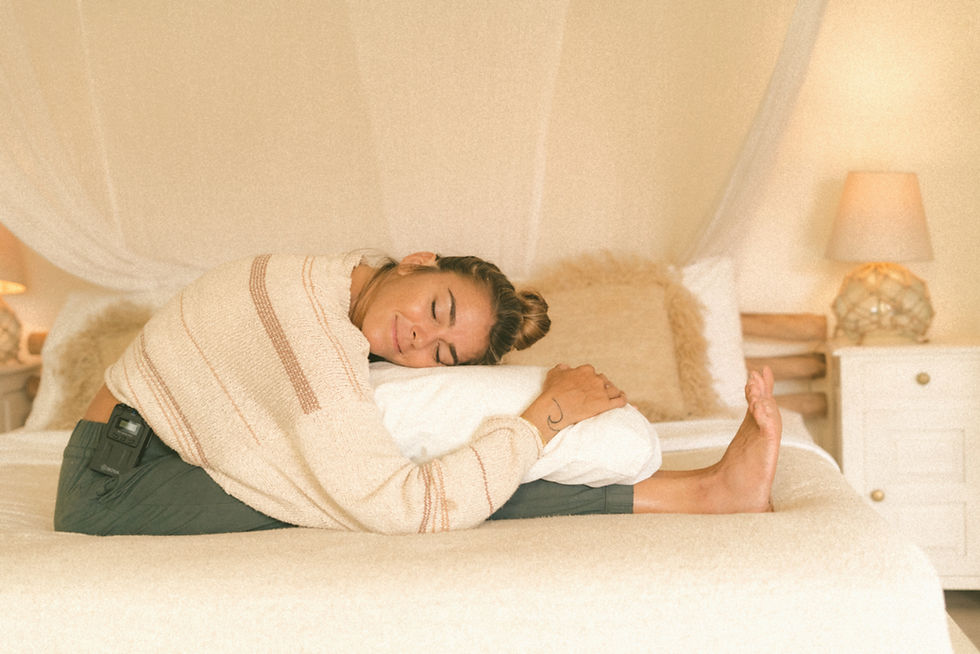Natural Ways to Sleep Better During Menopause
- Naziana Searle

- Sep 5, 2025
- 3 min read
Updated: Sep 8, 2025

Are you finding it harder to get a good night’s sleep? Hot flashes, night sweats, restless nights, and racing thoughts can leave you feeling exhausted, anxious, and frustrated.
Understanding why menopause affects sleep is the first step towards getting your rest back.
Hormonal Changes and Their Impact on Sleep
During menopause, falling levels of oestrogen and progesterone can interfere with your natural sleep patterns.
Oestrogen helps support serotonin and melatonin, which are essential for deep, restorative sleep.
Progesterone has a calming effect on your nervous system, so when levels drop, you may feel more restless or anxious at night.
I often hear from clients that understanding these changes is reassuring. It’s a natural stage of life.
Night Sweats, Hot Flashes, and Restless Nights
Night sweats and hot flashes can wake you repeatedly, making it hard to stay asleep. Small adjustments, like a cooler bedroom, breathable bedding, or a calming bedtime routine, can make a real difference.
Mood, Stress, and Anxiety during Menopause
Changes in mood, increased stress, and anxiety are common during menopause and can further disturb your sleep. Worrying about not sleeping can become a cycle in itself, the more you stress, the harder it is to rest.
Natural Ways to Sleep Better During Menopause
Lifestyle adjustments are often the first step in improving sleep. Simple, consistent habits can help regulate your body’s rhythms and support deep rest.
Sleep hygiene tips
One of the most effective natural ways to sleep better during menopause is to focus on consistent sleep hygiene:
Keep a consistent bedtime and wake-up time
Make your bedroom cool, dark, and quiet
Stress reduction and relaxation techniques
Try gentle breathing exercises, meditation, or journaling before bed.
A warm bath or shower can help relax tense muscles.
Exercise and daily activity
Moderate daily exercise supports your natural sleep rhythms, but avoid intense workouts too close to bedtime.
Spending time outdoors boosts vitamin D and helps regulate your circadian rhythm.
Diet and foods that support sleep
Limit caffeine and alcohol in the evening.
Include foods rich in magnesium and tryptophan, such as nuts, seeds, and oats.
For more self-care strategies for insomnia, check my blog post on self-care during menopause.
Homeopathy for Sleep During Menopause
Homeopathy can be a gentle and supportive approach if you’re struggling with insomnia during menopause. It works by supporting your body’s natural balance rather than forcing sleep, helping to address the root causes of restlessness, anxiety, and disrupted sleep patterns.
Why homeopathy may be beneficial
Tailored to you: Homeopathy considers your individual symptoms, lifestyle, and overall wellbeing, rather than offering a one-size-fits-all solution.
Supports natural rhythms: By gently encouraging your body to restore balance, homeopathy can help regulate sleep cycles and reduce night waking.
Addresses underlying triggers: Many women find that homeopathic remedies can ease anxiety, irritability, or hormonal imbalances that contribute to insomnia.
Non-habit forming: Unlike some sleep aids, homeopathic remedies work without creating dependence.
Many of my clients notice that with the right remedies over time, they can fall asleep more easily, stay asleep longer, and wake feeling more refreshed. Even small improvements in sleep can have a big impact on your energy, mood, and overall quality of life.
To see how personalised homeopathic remedies can make a difference to sleep, take a look at Homeopathy for Better Sleep, which includes a detailed real-life example.
Take the Next Step to Better Sleep
Even small improvements in your sleep can have a big impact on your energy, mood, and overall wellbeing. If you’d like a practical guide with personalised tips, and remedies, to help you rest more deeply, you can download my ebook, Better Sleep with Homeopathy. It’s packed with insights and strategies to help you wake up feeling more refreshed and energised.
Is homeopathy for you?
Homeopathy is used all over the world for so many health issues including insomnia. If you feel that sleeplessness is impacting your life, feel free to contact me if you think I may be able to help.
Next steps
If you’d like to explore how homeopathy could support your sleep, I offer a free 20 minute discovery call. During our call, we’ll talk about your symptoms, how they’re affecting you, and I’ll ask a few questions to see if homeopathy might be beneficial for you.
I am always happy to hear from you.
Naziana x


.png)


